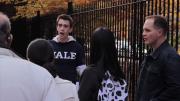Divining that Yale students spend a lot of time taking tourists around their campus in New Haven, a group of Harvard young bloods headed south last fall to help out. In case you missed the video of this undertaking shown on the comedy news program On Harvard Time (www.onharvardtime.com), you can catch up with the fun and the way-more-than-a-million fans already in the picture by switching on www.youtube.com/watch?v=EqsTatw-RT1.
The ringleader of the Crimson perpetrators was Samuel B. Clark ’15, of Denver and Kirkland House. A social studies concentrator, he is involved with several performing arts groups such as the Hasty Pudding Theatricals and On Thin Ice Improv, as well as On Harvard Time.
His tour touched on New Haven’s high crime rate and the shortcomings of Yale’s architecture and went on, “Yale is in many ways Harvard’s sort of little—perhaps less successful—sister.” Clark told his innocent tourist listeners that “Yale students are stupider than Harvard students.… Yale students are not as attractive as Harvard students.”
At the end of the tour, Clark may have gone too far and given the game away. “We don’t accept any tips,” he said, “but I will give you one: go to Harvard.”
Onward: Jonathan Newmark ’74, M.D., of Cincinnati and Bel Air, Maryland, reports that he retired as a colonel from the U.S. Army Medical Corps in November 2013. He had been a clinical neurologist and specialist in medical responses to chemical and biological warfare, and also, he believes, the oldest Harvard College graduate on active duty. For an encore he has returned to college on the post-9/11 GI Bill as a full-time graduate student in composition at the College-Conservatory of Music, University of Cincinnati. His first completed work done there, just performed, is a trombone sextet, each movement describing a skeletal bone, entitled Six Bones for Six Bones. He invites classmates to visit. “My apartment,” he promises, “has a roll-out couch, like any proper dorm room.”
Talking back to John Foster Dulles: Robert Richardson Bowie, Dillon professor of international affairs emeritus, died on November 2, 2013, at the age of 104. In April, Jorge I. Domínguez, chair of a small committee charged to write a memorial minute about Bowie, presented it to the Faculty of Arts and Sciences.
Bowie combined distinguished academic achievement with professional service at the highest levels of the U.S. government, said Domínguez, Madero professor for the study of Mexico and vice provost for international affairs. For his work after World War II as general counsel to the U.S. high commissioner for Germany, the German government awarded him the Commander’s Cross of the Order of Merit.
Bowie was devoted to making academic ideas matter in the world of policy, said Domínguez. His book Suez 1956 concerned a military crisis he experienced in government firsthand and involved criticisms of the administration of which he then was a part.
Bowie returned to Harvard to become the first Dillon professor and to found and direct what is now the Weatherhead Center for International Affairs. For him, said Domínguez, “the center was Harvard at its best, a self-governing community of scholars who worked hard, insightfully, and collegially on the central problems of the day.”
Bowie served as assistant secretary of state under John Foster Dulles. In remarks to the faculty not part of the formal memorial minute, Domínguez noted that Bowie told The New York Times in 1966, “ ‘Dulles complained once to me that no one would talk back to him.’ ” For his part, Bowie assured the Times, “ ‘I found that I had no trouble at all, apart from a two-week period when we weren’t speaking because I had been extra aggressive.’ ”








